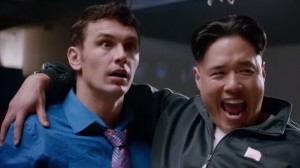The Interview
The Interview, 2014, 2 stars
Wasted opportunity
The Interview says “fuck you” to greatness, but we should still celebrate its screenings
Exclusive to MeierMovies, December 24, 2014
“For all sad words of tongue or pen, the saddest are these: ‘It might have been.’”
Starting a review of a Seth Rogen comedy with the closing line of John Greenleaf Whittier’s “Maud Muller,” one of the 19th century’s greatest poems, might seem a tad over the top. But it’s fitting considering that everything about The Interview is outlandishly bigger than life – from the incessant, infantile banter, to James Franco’s endless mugging and hamming, to the controversy surrounding the release of the film, which has elevated this otherwise forgettable farce into one of the most memorable cinematic events of the decade.
Before we examine how appropriate those immortal lines are, let’s first set the hoopla aside and look at the film itself. Directed by Rogen and Evan Goldberg, The Interview is mostly a buddy comedy between two characters with little intelligence and even less believability. Franco is Dave Skylark, the host of a popular talk show that focuses not on real news but on celebrity gossip. Rogen is Aaron Rapaport, Franco’s friend and producer, and though he graduated from Columbia University School of Journalism and apparently longs for a career in hard news, he’s been mostly content to pal around with Dave because that’s where the money and his own adolescent sensibilities lie.
When Aaron finds out that North Korean dictator Kim Jong-un is a fan of the show, he sees not just dollar signs but respectability. He realizes that if he can arrange an interview, however controlled it might be, he and Dave could rise to the level of media gods. But before the two can sneak off to the hermit kingdom, they are approached by an unnecessarily sexy CIA agent (Lizzy Caplan), who involves them in a preposterous plot to assassinate Kim.
Written by Dan Sterling from an admittedly clever story by Rogen, the film is really two movies, one buried inside the other. On the surface (and for the first hour), it’s just plain dumb, with endless vulgarities, bad jokes and a painfully incompetent Franco marring any chance of success. Seriously, why do people like this guy? It’s Christmas, so I won’t denigrate him as a human being, but it’s as if Henry Higgins stumbled into a frat kegger, found a reasonably handsome and charismatic douchebag, and attempted to pass him off as a real actor. Well, Henry, you should have stuck with Eliza Doolittle, because this lump of acting crap has bitten the bowl off the spoon one too many times.
Astonishingly, a smarter side to the film (the aforementioned movie within the movie) starts to surface once we meet Kim, about 50 minutes in. Yes, Randall Park has his moments as the dictator, but the about-face in quality occurs thanks to a script that finally shows some satirical wit. And once the actual interview begins and the screenplay reveals both its more serious and maturely funny frames, it’s enough to make you wonder whether all the brainless shenanigans of the first hour were simply a MacGuffin.
“How do you prove to 24 million people that their god is a murderer and a liar?” one of Kim’s propaganda minsters (Diane Bang) asks, while suggesting that the nation’s starving masses are longing for someone to rise up and reveal that their revered leader is nothing but an insecure, incompetent fool battling not just the United States but his own childhood demons. Ah, so THAT is why North Korea isn’t a fan of the film.
We even get some counterpoints to the traditional Western arguments, like when Dave theorizes, “Kim is not evil. He was just born into a hard situation.” Sadly, despite those clever moments and some truly funny slapstick, the film ultimately struggles to rise above lines like “let’s barbecue this motherfucker” and “his head looks like somebody’s taint.”
And so we return to Whittier. Perhaps if Rogen had known the whole world would be watching and longing for another The Great Dictator or Dr. Strangelove, he, like his character, would have tried harder to create something profound, something that actually deserved all the press it’s getting. Instead, he lost a precious opportunity to show the world why great art deserves to be seen.
Though I can’t recommend The Interview for traditional reasons, I applaud the fact that Sony reversed its original decision to pull the picture and not cave to terrorists, and so should you. Whether you agree with this review is not important. What is important is no one should tell Americans, or North Koreans for that matter, what they CAN see.
I began with great poetry, and I end with great words of political prose, words that we should always revisit when facing an enemy, whether that enemy be military might or censorship. “We shall defend our island, whatever the cost may be,” Winston Churchill said when confronting something far more horrific than this current bunch of terror-bent hackers calling themselves Guardians of Peace. “We shall fight on the beaches, we shall fight on the landing grounds, we shall fight in the fields and in the streets; we shall fight in the hills. We shall never surrender. … Never give in. Never give in. Never, never, never, never — in nothing, great or small, large or petty. Never give in, except to convictions of honor and good sense. Never yield to force. Never yield to the apparently overwhelming might of the enemy.”
© 2014 MeierMovies, LLC
For more information on this movie, visit IMDB and Wikipedia.
